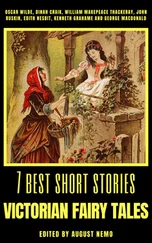“I remember!” Flax said. “She had a shelf of fancy hats.” And the conversation drifted away from Unanticipated Seminars and the Mystery of Life and Death and entered the comfortable area of family history.
VIII.
That Saturday morning, shapeless in her flannel robe, Bonnie tiptoed into the living room, not bothering to close the bedroom door. She took a brown bottle from her pocket. It held the extract of the P. vulgaris root, a variety of primrose. This liquid was the Czech preparation solutan —a nostrum against bronchial asthma and bronchitis. She poured some solutan into Plant, practicing a version of homeopathy. “Take some of your own medicine.” Her cousin in Prague supplied the stuff to Reilly, the chemist, his shop not far from the Zizkov Tower. The Irish are as disseminated as the Jews; Flax had noted this. Concealed behind a half-closed door he had frequently watched Bonnie dose Plant. This morning he was watching from bed. “I love you,” he whispered to his wife, who couldn’t hear this unoriginal unbeatable declaration. Of necessity he whispered it also to P. vulgaris flaxbaum, who might be developing a rudimentary tympanum within that coiled leaf, who knew, Linnaeus and Darwin and Dawkins hadn’t figured out everything; and Plant, like the rest of the family, was entitled to its secrets. He often wondered what unanticipated being Plant was destined to become. But he wondered even more frequently what kept the organism going — cilantro, mouthwash, slain numerals, coffee, a Mitteleuropean nutraceutical, the last ashes from Uncle Jack’s cigar? A mystery, isn’t it, Blessed Harry.
The statue — hollow, bronze, about three feet in height and about thirty pounds in weight — wasn’t the sort of thing Rennie usually bought. And for an excellent reason: it wasn’t the sort of thing she was able to sell. In the antiques business you couldn’t just follow your whim; you’d go broke in a month. At Forget Me Not, Rennie’s shop, she dealt in French clocks, and English silver, and pottery made a century earlier in a Boston settlement house — a set of those plain plates now fetched more money than the immigrant potters had made in a year. Forget Me Not was known for its Regency teapots and Victorian jewelry and hat pins from the 1940s, bought these days by collectors or — who knew? — murderers.
Rennie herself was known for discretion and restraint. She allowed certain customers to use the telephone to get in touch with a detective or a divorce lawyer — cell phone calls can be traced, the customers nervously confided; may I…? Old ladies came in with valuable saltcellars; circumstances had forced them to part with the family silver. Men bought pendants for women not their wives. Elegant matrons wept over sons in jail. Rennie kept such facts in her head like diplomatic secrets. And this caution had led, through the years, to a general prudence: she did not tell any customer anything whatsoever about any other customer. It was one of her two cardinal rules.
The other rule also involved keeping her mouth shut: she refused to give advice. “Advice is the province of psychiatrists and hairdressers,” she said. “Me, I’m just a rag-and-bone woman.”
The statue belonged in a chamber of oddities. Rotund, almost naked, male — at least, fig leaves hinted that the figure was male — with a little jacket over his shoulders and a top hat over his curls. He carried a spear in one hand and held a mirror aloft in the other. His face was round and merry.
Ophelia Vogelsang had staggered in three months ago with this fellow in her arms. “From Uncle Henry’s apartment,” she’d crowed, as if saying “from the Vanderbilt collection.” She set the statue on the floor and sank onto the striped love seat.
Ophelia was also small and round. She wore her abundant hair — mostly beige but streaked with rust and pewter and old gold — in the confused whorl she must have adopted during her free-spirited days in New York’s Greenwich Village. She had been in her twenties then, under the guidance, such as it was, of her uncle Henry. She was seventy-five now, and for the past half century she had lived here, in Godolphin, Massachusetts, with her dear husband, Lew. Lew had died six months ago.
The day Ophelia brought in the statue she was wearing her version of widow’s weeds — black sneakers, a full black skirt, a black blouse open at the throat, and long earrings woven out of tiny beads. She bent to touch the statue’s curls. “He’s called Puck,” she said, looking up at Rennie. “He guarded Uncle Henry’s back parlor fifty years ago. Though parlor isn’t the right word.” And she sat up straight and shook her earrings. “The place was all carpets and cushions and fringes. Oh my! Not a chair or a respectable piece of furniture in sight. A room to frolic in.” She poked her fingers into her unfashionable, immensely flattering coiffure, dislodging several gingery strands which then floated near her lined and lovely face. “Puck watched over my love and me.” She didn’t smile in a reminiscent fashion, as a less subtle person might have done. She didn’t smile at all. Nevertheless, information was transmitted.
“The statue stood on a pedestal in the archway,” she went on. “We could see it from our pillows on the floor.”
Rennie had been running Forget Me Not for twenty-five years; very little could shock her. But even twenty-five years ago, the news that Ophelia had once conducted a love affair on the floor of Uncle Henry’s back parlor would not have brought a lift to Rennie’s eyebrows. Yet something did surprise her — a hot fizz that accompanied the little confession. The space between the two women seemed to have been sprayed with attar of sentiment.
“Are you selling the statue?” asked Rennie, high on romance.
“I am.”
“Well, I’m buying,” Rennie heard herself say.
“I’m so glad,” Ophelia said. “I wanted to honor dear Lew’s last wishes, and one of them was get rid of that goddamn Puck.”
So apparently it was not husband Lew who had made love to Ophelia on the floor of Uncle Henry’s parlor. But it was certainly Lew — a small, twinkling academic — who had made her happy for half a century. And it was Lew who had collected modern paintings — oblongs of gray overlapping other oblongs of gray. “Puck did look out of place in our living room,” Ophelia admitted. “But Uncle Henry had left him to me — what could I do? Now Lew’s wishes trump Uncle Henry’s. And I drop in here so often — I’ll get to visit the boy. Until you sell him, of course.”
Rennie figured she would die before unloading this impulsive purchase. Nevertheless, she installed Puck in the shop window. There he brandished his spear and waved his mirror for several weeks. Children passing by pointed at him and laughed. Dogs too seemed to laugh. Rennie moved him inside and put him next to an elaborate Chinese vase. It was a miserable pairing. Finally she put him on top of the safe. And so a customer entering Forget Me Not saw the usual old things: the striped love seat facing the waist-high jewelry case; within the jewelry case, brilliant adornments; behind the case, impassive Rennie; and behind Rennie, the safe, high on its table. And one new thing: cavorting on top of the safe, a plump bronze boy.
The man with the white mustache came in on a Monday. He was tall and somewhat awkward, but his suit was expensive. The tanned skin around his eyes was puckered and pleated, so that the eyes seemed on display.
“Good morning,” he said. “I’m staying at Devlin’s Hotel — they recommended your shop.”
“Good morning,” Rennie said.
His blue gaze traveled around on a preliminary excursion. It landed briefly on Puck. “That’s a nice piece.”
Читать дальше












